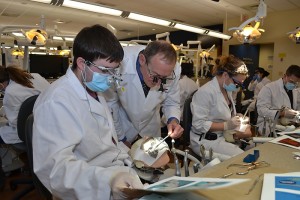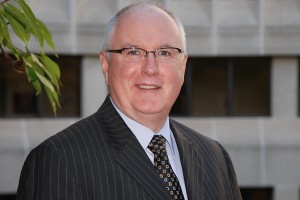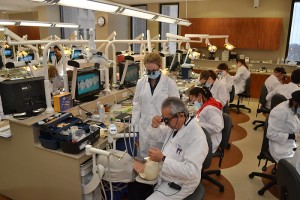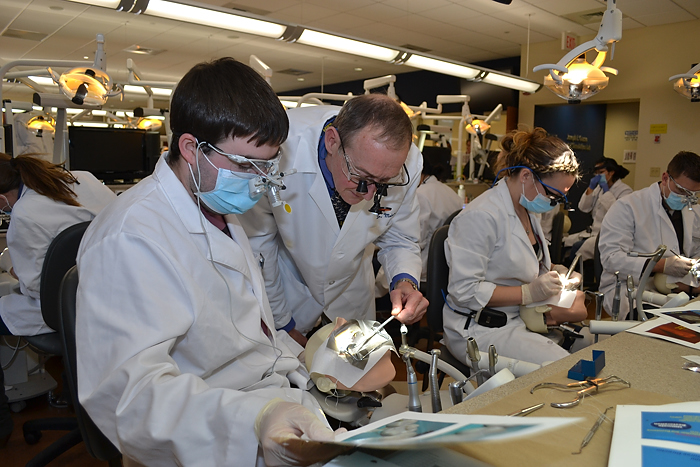
Students and faculty at the UConn School of Dental Medicine have many reasons to smile these days. National recognition, the delivery of affordable dental care to the community, innovative programs, strong grant funding and leading-edge research are just a few of them.
“Leading through science and service” is the school’s philosophy, and it is reflected in all aspects of the school, according to Dr. R. Lamont MacNeil, dean of the dental school. “We are a school grounded in science and service,” he explains. “That’s a differentiating fact for us, and it’s reflected in the national recognition and honors that our faculty and students receive.”
“Leading through science” is evident in the school’s unique curriculum. “Our dental students get in-depth exposure to basic medical science as a core component of the curriculum,” MacNeil says. “Our students participate in about 80 percent of the biomedical sciences curriculum, side by side with medical students, and that is rare in our field. It’s an intense and contemporary science education, as comprehensive as anywhere in the country.”

“Leading through service” is also apparent through the dental care and service activities provided by students, residents and faculty at the school’s dental clinics in Farmington and at affiliated community clinics located throughout the state. Almost one-quarter of students’ clinical education takes place at sites across Connecticut. “We think it’s important for our students to be out in the community and learning about the people they will be treating in their professional lives,” MacNeil says. “We treat and help patients from every zip code in Connecticut.”
Both adults and children are treated in the clinical sites, where fees are either reduced or assisted by federal or state programs. In many cases, patients served are uninsured or underinsured and might not be able to otherwise afford dental care. The school’s dental clinics at the UConn Health Center in Farmington recorded more than 94,000 visits in the past year. In addition, students, residents and faculty provided more than 48,000 visits to the community at its affiliated sites.
The dental school’s national recognitions are numerous and impressive. “A significant number of our faculty are involved in and leaders of professional organizations,” MacNeil points out. “On the student level, we have one of the most active chapters of the American Student Dental Association. A large number of our students are involved on the national level. When I travel outside the state, I quickly realize that we are known nationally as a very active school.”
MacNeil believes that a major advantage of the school is the ratio of dental students to residents in training. “We have about 90 students in clinical training over the last two years of the DMD program, as compared to about 100 residents or graduated dentists who are pursuing advanced or specialty training. This provides great opportunities for students and residents to train and learn together, and the faculty has been very good at encouraging this and maximizing the educational possibilities.” The school offers programs in almost all of the dental specialties.
Although there are no formal national rankings of dental schools based on performance, UConn dental students consistently perform within the top three schools on national board exams. With few exceptions, 100 percent of UConn students pass these exams on their first attempt, compared to a nationwide passing average of 80 percent to 90 percent. “These numbers are a measure of the strength of our program and the strength of our students,” says Dr. Steven Lepowsky, senior associate dean for education and patient care.
Unlike medical students, who must complete a residency after they earn their degree, dental students can get a license and practice immediately after graduation. However, at UConn, 95 percent of students pursue residency training after graduation. “That’s also an outcome we aspire to and are proud of,” Lepowsky says.
Research Excellence

Since its inception in 1968, the dental school has been a prominent leader in dental education, research, patient care and community outreach, and its reputation for excellence earns the school a significant number of grants each year.
“One of the most important grants we receive [from the National Institute of Dental and Craniofacial Research (NIDCR)] is a training grant to support doctoral, combined DMD/PHD and post-doctoral training,” says Dr. Susan Reisine, the school’s associate dean for research. The most recent five-year, $2.9 million NIDCR grant provides a stipend for students doing residency training, supporting the advanced training of dental professionals in a variety of specialty areas. The school currently has 54 active research grants, and the current year’s total dollar award is $8.23 million.
Funding for student research also comes from alumni support, from faculty members and from the Health Center’s Research Advisory Committee, which supports many different types of scientific investigation. “Almost half the class is involved in student research, which is unusual among dental schools,” Reisine explains. “We have a long history of providing research experiences for our students.”
Projects funded in 2011 include studies of bone loss associated with periodontal disease, the harvesting of bone marrow stem cells, and oral health disparities in older adults. “Skeletal and bone biology have major research emphasis here,” Reisine says.
Follow the UConn Health Center on Facebook, Twitter and YouTube.



